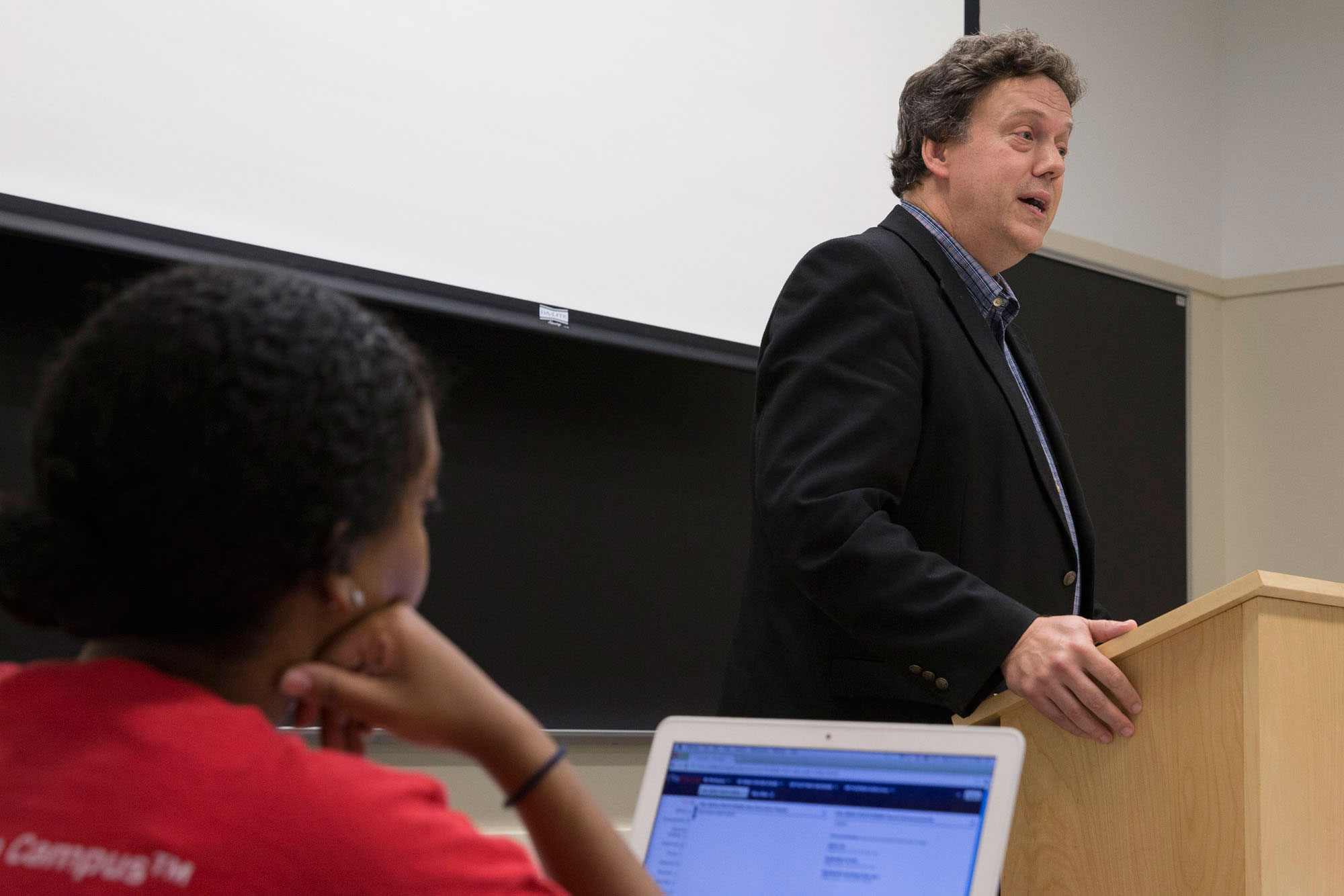In late July 1990, W. Scott Harrop was teaching a summer session course on the Persian Gulf in world affairs, a world he’d recently experienced in his work for the government. He’d just wrapped up a lecture that explained the crucial role in which oil-rich Kuwait played in the area’s economics.
The next day, Iraq invaded.
Curveballs like that have helped Harrop, a longtime adjunct lecturer in the University of Virginia’s Woodrow Wilson Department of Politics and the Department of Middle Eastern and South Asian Languages and Cultures,shape his current course on “Recent Revolutions in the Islamic World.” The four-week summer school offering takes a whirlwind examination of the modern-day Middle East’s conflicts and causes, while Harrop strives to keep his students – and his syllabus – on top of the region’s shifting landscape.
“They’re hard to predict,” he said. “You may not see revolutions coming in political science, but if you’re following the literature, the music, the arts [of a region], you feel a building sense of rage – not just against the inequalities, but the terrible corruption in many of these countries’ governments.”
He sprinkles the news clips, YouTube videos and revolution songs that punctuated the 2009 Green Movement in Iran and the 2011 Arab Spring in his lectures to show that though the class is political in nature, an understanding that crosses disciplines – religion, music, sociology and economics – can help students grasp the meaning behind the tumult. In the weeks ahead, he plans to explore the Middle East’s new turns to radical jihadism and the current situations in Syria, Egypt and Iraq as they unfold.
“I’ve always been interested in politics, and the Middle East is not something you can avoid if you follow U.S. politics,” Jay Kang, a fourth-year psychology major, said. “But though I’d been following the news, I didn’t actually understand much about it, so I wanted to take this course and improve my knowledge of the region and what’s going on in the news.”
As the class discusses the catalysts of upheavals that most students started following in high school, they often go back much farther to understand the tensions behind the crises – internal economic struggles and religious tensions, mucked-up foreign relations and nuclear fears.
But along with reading analyses of the violence in the headlines, they’re encouraged to put themselves in the place of Congressional officers and foreign diplomats – because there are always debates about the U.S. role.
In one recent lecture, Harrop emphasized the desire of the Iranian people, and the entire Arab world, for mutual respect between their nation and America. In both Iran and the U.S., he said, “we want our ideas to be freely heard, our independence to be recognized, our spheres of influence to be recognized. At the key end of the [1979] hostage crisis was recognizing the Islamic Republic of Iran as legitimate. … You don’t have to like the system to understand the rhetoric of mutual respect.”
All revolutions, which he defines as struggles to overthrow political regime, yearn for both local support and international recognition, he said.
An avid scholar of Thomas Jefferson, Harrop also encourages his class to think about the way U.Va.’s founder would view the Arab world’s push for democracy.
“We’re studying revolutions at a place founded by America’s own revolutionary icon, and he had so many ideals for America that I think have a lot to do with whether these revolutions are going to survive in the Middle East,” Harrop said, noting that Jefferson owned a Quran.
Lydia Eyob, a rising fourth-year foreign affairs and African studies double major, agreed that Jefferson was relevant. “Incorporating Thomas Jefferson standpoints is what initially grabbed my interest in the class,” she said. “I’ve studied the Middle East in depth a lot with previous classes, and it’s interesting to think about it from his perspective.”
Even among revolutions that are squelched, like the Iranian Green Movement that ended in a corrupt election and the “Arab spring” that brought rise to new – but not necessarily better – regimes, Harrop argues that they send messages to oppressive governments.
“First and foremost, these were revolts of people seeking freedom – and these were ideals that have long been accepted in the culture,” he said. “You can’t put it in a bottle. The sentiments for freedom are still there.”
Media Contact
Article Information
June 26, 2014
/content/summer-session-students-contemplate-islamic-uprisings-they-unfold

